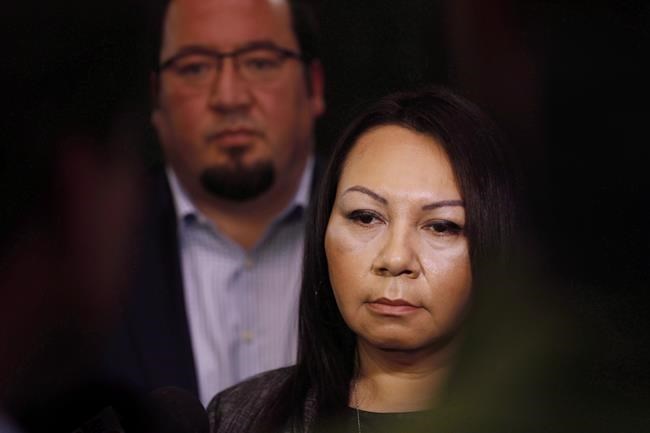OTTAWA — Sheila North, a former grand chief of Manitoba Keewatinowi Okimakanak, announced Thursday she is joining the contest to become the next national chief of the Assembly of First Nations.
North told reporters at a news conference in Winnipeg that some chiefs don't feel they are being listened to by regional and national leadership in the advocacy organization, which serves as a national voice for more than 600 First Nations across the country.
She said she has spoken with chiefs who are frustrated by a lack of movement on policy resolutions they have adopted — and that has to change.
"I think it's time to take the Assembly of First Nations back to the chiefs of Canada, because it's their organization," she said at a news conference in Winnipeg on Thursday.
"Chiefs don't work for the AFN — the AFN should work for the chiefs."
It means that chiefs in the assembly must feel their opinions are valued, and their resolutions will be implemented, she said.
North is an advocate for missing and murdered Indigenous women, a former journalist and a member of Bunibonibee Cree Nation.
She told reporters that she has the right qualifications, training and people around her to become the next national chief, and she has received endorsements from Bunibonibee Cree Nation Chief Richard Hart and others across the country.
North is currently working with the International Commission on Missing Persons, which is consulting with Indigenous communities that are interested in searching for unmarked graves near former residential school sites.
She said she would continue in the role, which involves helping the group to facilitate community engagement sessions, if she is elected. But she would make changes to make sure that the work is not hampered by her new gig, she said.
The upcoming election comes after the dramatic ouster of former national chief RoseAnne Archibald, who was voted out after colleagues accused her of creating a toxic work environment — an allegation she continues to deny.
The deadline for nominations in the contest is Nov. 1, and the vote is set to occur on Dec. 6 during a special chiefs assembly in Ottawa.
North said the election process is a "spiritual journey," and she has been called to fast until the election.
"I commit to that, because I know this is a very serious job."
She said that during her time at Manitoba Keewatinowi Okimakanak, she was "relentless" in her efforts to get the federal government to address the health crisis in the province, especially in Manitoba.
She also spoke of how she commissioned a study by Brandon University, alongside Manitoba's Southern Chiefs' Organization, that found Indigenous Peoples in Manitoba contribute $9.3 billion to the economy.
"Manitobans know that Indigenous people have value, that we are here, and we do contribute."
She acknowledged that challenges such as poverty and substance use are not unique to Indigenous Peoples.
But she said that during conversations with various chiefs leading up to her Thursday announcement, most of them told her they had recently attended funerals because of ongoing substance-use and mental-health crises.
"We are in dire straits," said North.
"We need to start addressing these real issues and we can't do the old way anymore."
To address those issues, treaties and the inherent rights of First Nations must be respected, she said, including the right to self-govern.
"We need our own health systems. We need our own justice systems."
And, more importantly, she said, the AFN needs to stop acting as a kind of administrative arm of the federal government.
"We need to change that," she said.
David Pratt was the first person to announce his intention to run to be the new national chief in August.
Pratt currently serves as a vice-chief with the Federation of Sovereign Indigenous Nations, an organization representing 74 First Nations in Saskatchewan.
In his announcement, Pratt said the AFN is at a "critical juncture" and the election is about restoring and rebuilding the national organization.
Manitoba regional chief Cindy Woodhouse, the lead Assembly of First Nations negotiator for a landmark child-welfare settlement passed this week, announced her candidacy earlier this month.
Woodhouse said that growing up in Pinaymootang First Nation, she saw a disparity between her community and non-Indigenous communities. As a result, she said, she is devoted to making the lives of First Nations people more equal.
Woodhouse also said that she is a "bridge-builder" who would work on First Nations policing, as well as renewing and strengthening relationships federally and provincially.
This report by The Canadian Press was first published Oct. 26, 2023.
Alessia Passafiume, The Canadian Press



